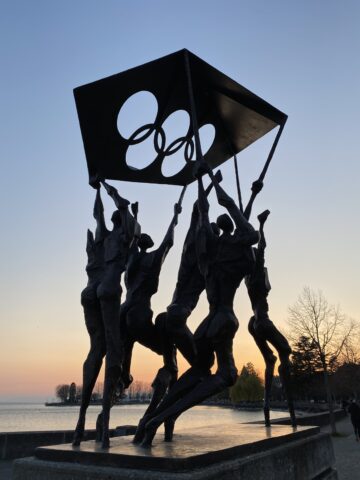SFT Judgment 4A_40/2017 – Football Club X. v. Z. – Termination of a contract of employment with just cause
Erroneous judgment on Jurisdiction / violation of public policy (inadmissible); violation of the parties’ right to be heard (unfounded)
The Issue
Termination of a football contract of employment by the player with just cause – Deciding in equity without the parties’ permission (instead of applying a particular set of rules) is not a ground for annulment of the arbitral award based on Art. 190 (2) (b) PILA
The Facts
On 17 November 2016, the CAS rejected the appeal filed by the Football Player Z (the Player) against a FIFA DRC Decision between the Player and the Football Club X (the Club). The CAS also partially upheld the appeal filed by the same Club X, ordering it to pay the Player a total of USD 366’166 for unpaid salaries. However, it did not order compensation for breach of contract without just cause (under the provisions of Art. 17 (1) of the FIFA Regulations on the Status and Transfer of Players, RSTP).
In the subsequent appeal before the Swiss Federal Tribunal, the Appellant (the Club) attacked the Award on the ground that the Arbitral Tribunal ruled on the case in equity instead of applying a specific set of rules (in casu the Swiss Code of Obligations). The Appellant employed the same argument but alleging the various grounds for annulment of an arbitral award under Art. 190 (2) Swiss Private International Law Act (PILA).
Deciding in equity is not a ground for annulment of the award based on Art. 190 (2) b PILA
More specifically, the Club alleged violation of Article 190 (2) (b) PILA (which relates to the erroneous jurisdiction of the arbitral tribunal) because the Panel ruled in equity and therefore ruled “extra potestatem”. The Federal Tribunal rejected this ground as inadmissible since deciding in equity (without the parties’ authorization) might constitute an irregularity which does not affect the jurisdiction of the arbitral tribunal in the sense of Art. 190 (2) b PILA (4A_40/2017 at 3).
It is worth adding that a similar question (ruling ex aequo et bono instead of applying a specific set of rules) was also dealt with in a previous SFT judgment in 2012 (SFT 4A_14/2012 of 2 May 2012, at 3.2.2, a commercial arbitration procedure). In this case, the SFT had acknowledged that ruling ex aequo et bono was an irregularity that falls outside the scope of jurisdiction (even if this question was unclear in the doctrine). It further held that this irregularity could somehow relate to the violation of public policy (Art. 190 (2) (e) PILA, see ATF 116 II 634 at 4a) if it meets the conditions for violation of public policy. In any event, there is no such violation if the Panel simply reinforces its legal reasoning and does not abandon the realm of the law to go into ex aequo et bono.

Criticisms related to the non-application or the incorrect application of a specific legal provision fall outside the scope of Art. 190 (2) d PILA
The Appellant equally attacked the CAS Award for violation of his right to be heard (Art. 190 (2) d PILA) because the Panel failed to expressly state in its award what law it applied and the reasons why it did not apply the law that corresponded to the applicable regulations of FIFA and CAS and the agreement between the parties (4A_40/2017 at 4.2).
The Federal Tribunal dismissed the aforementioned argument by holding that the Panel had indeed dedicated an entire section analyzing the question of applicable law in which it reserved itself the right to apply Swiss law subsidiarily, according to the pertinent FIFA and CAS Rules.
The CAS Panel had further concluded that the Player had terminated the contract of employment with just cause and on such basis the Club had to pay the unpaid salaries to the Player. However, and based on the specificity of sport (provided for in Art. 17 of the FIFA RSTP) the Panel found that the club only owed the outstanding salaries for having terminated the contract without just cause.
The Federal Tribunal concluded that the Panel did not violate the Appellant’s right to be heard through its analysis. It considered that, in reality, the Appellant was criticizing the fact that the Panel did not apply – or inappropriately applied – a specific legal provision. However, said criticisms fall outside the scope of review of the Federal Tribunal under Art. 190 (2) PILA (4A_40.2017 at 4.2).
The Takeaway
In essence, this was a very short judgment where the Panel swiftly dismissed the one and sole argument that the Appellant raised by invoking the violation of Art. 190 (2) PILA under different angles: erroneous jurisdiction, violation of his right to be heard and, finally, violation of public policy – however without further comments on the last ground, see 4A_40/2017 at 5). There are very few takeaways from this judgment. The parties invoking various grounds for appeal (even based on the same main argument, as it was the case here) must develop each ground separately and establish the reasons that the particular argument / situation violated the particular provision of Art. 190 (2) PILA (see also Art. 77 (3) of the Swiss LTF (Law of the Federal Tribunal); see 4A_40/2017 at 5).
Keywords
Appeal to the Swiss Federal Tribunal; CAS Award; Football; Termination of a contract of employment; Just cause; ruling in equity; erroneous judgment on jurisdiction (no); violation of public policy (no); violation of the parties’ right to be heard (no).
Note: the full judgment is available in French at the website of the Swiss Federal Tribunal www.bger.chThe English translations of the international arbitration decisions rendered by the Swiss Federal Tribunal (from French, German and Italian) are available on the website www.swissarbitrationdecisions.com, operated jointly by Dr. Despina Mavromati and Dr. Charles Poncet as a service to the international arbitration community.





